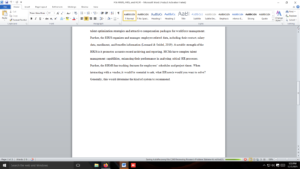Human resource management systems
All Those Letters!
What are the differences among HRMS, HRIS and HCM? What are the similarities? What are the strengths or weaknesses of each with regard to providing HR with data to support evidence-based decision making? What sort of questions would you have for a vendor?
Measurements
These chapters provide an overview of providing measurements to process.
Chapter 4, “Good Survey Practices: Don’t Reinvent the Wheel,” pages 31–38.
Chapter 5, “Anonymity vs Insights: Confidentiality and Organizational Data Matching,” pages 39–44.
Human Resource Information System (HRIS)
Leonard, K., & Seidel, M. (2019). Advantages and disadvantages of human resource information system. Retrieved from https://smallbusiness.chron.
The reading covers information and analysis on HRIS.
Foxall, D. (2019). HRMS vs HRIS vs HCM: What’s the difference? Retrieved from https://www.hrmsworld.com/
Requirements: 150
Answer preview
On the other hand, the HCM provides data to promote workforce initiatives such as talent optimization strategies and attractive compensation packages for workforce management. Further, the HRIS organizes and manages employee-related data, including their contact, salary data, enrollment, and benefits information (Leonard & Seidel, 2019). A notable strength of the HRIS is it promotes accurate record archiving and reporting. HCMs have complex talent management capabilities, enhancing their performance in analyzing critical HR processes. Further, the HRMS has tracking features for employees’ schedules and project times. When interacting with a vendor, it would be essential to ask, what HR needs would you want to solve? Generally, this would determine the kind of system to recommend.
[218 Words]

Human resource management systems

